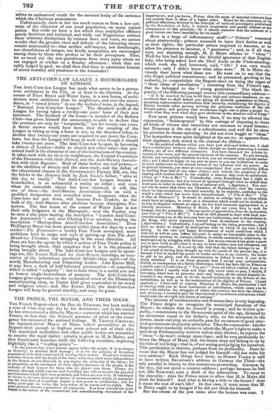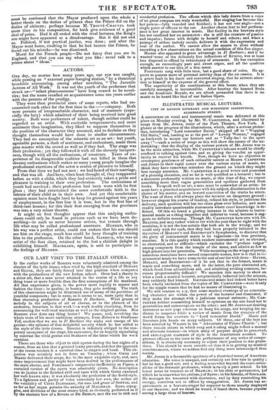THE PRINCE, THE MAYOR, AND THEIR IDEAS.
THE French Regent-elect, the Due de NEMOURS, has been making a tour of what may one day be his dominions; and in his travels he has encountered a didactic Mayor,—a portent which has startled France, no less than the Prince's presence of mind on the emer- gency has reassured the national feelings. M. TROUVE- CHAUVEL, the reputed-clever Mayer of Mans, talked generalities at the Regent-elect enough to frighten some princes out of their wits. The municipal authorities and other public bodies are assembled to receive the royal visiter : priority is given to M. le Maire; and that functionary launches forth the following exordium, beginning frightfully like a "leading article"— "In the present day, when princes appear before the people, it is no longer, as formerly, to demand their homage ; it is for the purpose. of becoming acquainted with their wants and of bearing their desires. These new relations between citizens and the beads of the state, while they show more independence in the former, do not diminish in any degree the authority of the latter; for in proportion as the sentiment of their dignity increases in the people, is the increase of their respect for those who are placed over them. Prince, the country through which you are no* travelling has still to re,:eive the physical ameliorations which have been promised, and which are due to it. It had hoped to obtain in its turn those great means of communication which, in augment- ing the vital force of a country, impart a new power to civilization ; and fcr many years past no notice has been taken of its wants and its rights. May your presence become a guarantee of reparation. You have entered the town which is the centre of the commercial and manufacturing movement of the department; and you know, Prince, that the sense of material interests does not exclude from it ideas of a higher order. Noted for the constancy of its political affections, devoted to the principle of national sovereignty proclaimed by the Revolution of July, it regards progressive and pacific reforms as the consequence of this principle ; for it cannot conceive that the outburst of a great nation can have immobility for its result."
Here is a heap of inflammatory stuff!—" Princes" reasoned about abstractedly ; princes assumed to have their duties as well
as their rights; the particular prince required to become, or to allow his presence to become, a " guarantee"; and, as if all that were not alarming enough, M. le Maire alludes to " ideas " I Well for him had he shared the blissful ignorance of that English lady, who being asked how she liked Locke on the Understanding, which work she had borrowed, said, " Oh ! I was very much amused ; only I didn't know what ideas were." M. le Maire ob- viously does know what ideas are. He went on to say that the city forgot political resentments; and he presumed, growing in his audacity, to congratulate the Regent-elect on being the organ of " these ideas of conciliation " ; assuming from the Prince's age, that he belonged to the " young generation." The black de- pravity of the following passage crowns this extraordinary address- " if it be reserved for you to fill these high and arduous functions, we are confident that we shall behold you giving all desirable guarantees to liberty, accepting representative institutions with sincerity, maintaining the dignity of France towards other powers, reviving the generous traditions of the old French policy, and proving that revolutions ought not to place a people be- neath what they were when they gave obedience to the absolute will of kinga."
Now most princes would have been, if we may be allowed the expression, " flabbergasted" by this outrage of imputing to them all kinds of virtues and intentions not common to royal breasts ; but NEatouas is the son of a schoolmaster, and well did he show his practice in theme-spinning : he did not even boggle at "ideas." The bystanders were quite delighted at the set-to; as appears from their applause, duly noted in the Journal des Dibats- ., In the political address which you have just delivered before me, I shall draw a distinction between ideas, which, though no doubt possessing a certain affinity, are of two different characters. You have discussed the private in- terests of the town, and the general interests of the country. To put forward, defend, and successfully establish the first, you are invested with special autho- rity; and I shall be happy on my part to prove to you my inclination to unite in your endeavours to the utmost extent of my influence and my power. As to general interests, you must at once comprehend that your authority differs in nothing from that of any other citizen ; and, indeed, the propriety of dis- cussing such matters here in too explicit a manner may even be questioned. (Cries of " Vise le Roil ") Undoubtedly, every Frenchman has a right to publish his opinions; but you cannot be ignorant throagh what an ordeal they must pass in order to merit the title of national will. (Applause.) You can- not but be aware that there are Chambers of Parliament ; that the country elects its representatives; that their assembly, by its majority, publishes to the world a voice which has never been misunderstood. (" Vice le Roil " Vice le Due de Remmers!") It would be useless to enlarge here on ideas which could have no judges, to enter on a discussion which could not be decided, or to lose in disputes without au object the few brief moments appropriated to a friendly interview. Monsieur le Make, I did not come here to seek for homage, but for sympathy. (Strong marks of approbation from the bystanders, and cries of " Vine le Roi !") I shall be well pleased to meet with such sen- timents among you, in the love you bear our institutions, and in devotedness to the King, who never separates himself from devotedness to the country. (Approbation.) Undoubtedly, 1 myself belong to the rising generation; bet I
i
have no desire to despoil by anticipation that to which in my turn I shall belong. In the vast and happy development of social conditions which I wish for as well as you, letarns not omit to assign an honourable place to dis- tinguished services, to eminent abilities, to minds exercised by experience, to hearts proved by struggles with fortune. Let us not esteem it too great amerit not to have lived at all—that is to say, to have neither seen nor compared, nor judged for ourselves. It is not by this title that the future belongs to us. If I tun proud of having been brought up with the youth of the present day, it is because I feel in myself the power to render services to my country, the desire to add to its glory, and the determination to defend it were it ever to be really attacked. It is on those grounds that I accept your anticipations. Called, in consequence of a family misfortune, which has been felt in France as a public one—(Loud cries of " Yes, yes " from all sides)—called, I say, to a position which I equally wish and hope may never come to pass, I should, if necessary, know how to preserve, pure and intact, all the sacred deposits in- trusted to my charge, and to devote myself exclusively to the defence of our institutions, as well as to the maintenance of the dignity of France. (Loud applause.) I have still to express, Monsieur he Maire, the satisfaction I feel at sharing with you in those sentiments of conciliation, which cause you to cover with oblivion the struggles of which this country has been the theatre and, with you, I earnestly pray for that concord of sentiments and actions which constitutes the strength and union of nations."
The mixture of condescension and firmness here is very imposing. The Prince deigns to recognize the municipal functions of the
Mayor ; he admits that he himself is young; he invites sym- pathy,—concessions to the Democratic spirit f the age, dictated by an astuteness equal to his father's, who, on his accession to the throne, made carrying an umbrella pass for an earnest of good prac- tical government on popular principles. Thus far concession : but the Regent-elect resolutely refuses to admit the Mayor's right to make a speech on Parliamentary matters unless duly elected; he rejects the " ideas "—he won't enlarge upon them ; and he very profoundly in- forms the Mayor of Mans, that the fnture does not belong to us by the title of not living—that is, of not seeing and judging for ourselves. This predication is obscure, perhaps from its profundity. Does he mean that the Mayor has not judged for himself—did not write his own address ? Such things have been, as Hoarna Tools is said to have written BECKFORD'S address to GEORGE the Third—the only parallel in history to this monstrous proceeding. Gsoaos, by the way, did not spout a counter-address; perhaps because he bad not, like Nkatouas, seen a draft of the admonition. To recur to the obscurity : does the Prince mean to allow that M. le Maire did think for himself? And what is having a title to the future ? does it mean the rest of one's life ? In that case, it must mean that M. le Maire ought to be hanged if he did not think for himself. But the cream of the jest came after the lecture was over. I must be confessed that the Mayor produced upon the whole a better thesis on the duties of princes than the Prince did on the duties of citizens ; perhaps because M. Taouvi-CmtuvEL took more time to his composition, for both give evidence of a good deal of pains. Had it all ended with the rival lectures, the Ring's son might have appeared at a disadvantage. But it did not end so. Political, if not poetical justice, was done ; and after the Mayor went home, exulting in that he had beaten the Prince, he found out his mistake—he was dismissed.
Moral for the French people—Do not fancy that you are in England, and that you can say what you like : never talk to a prince about " ideas."



























 Previous page
Previous page